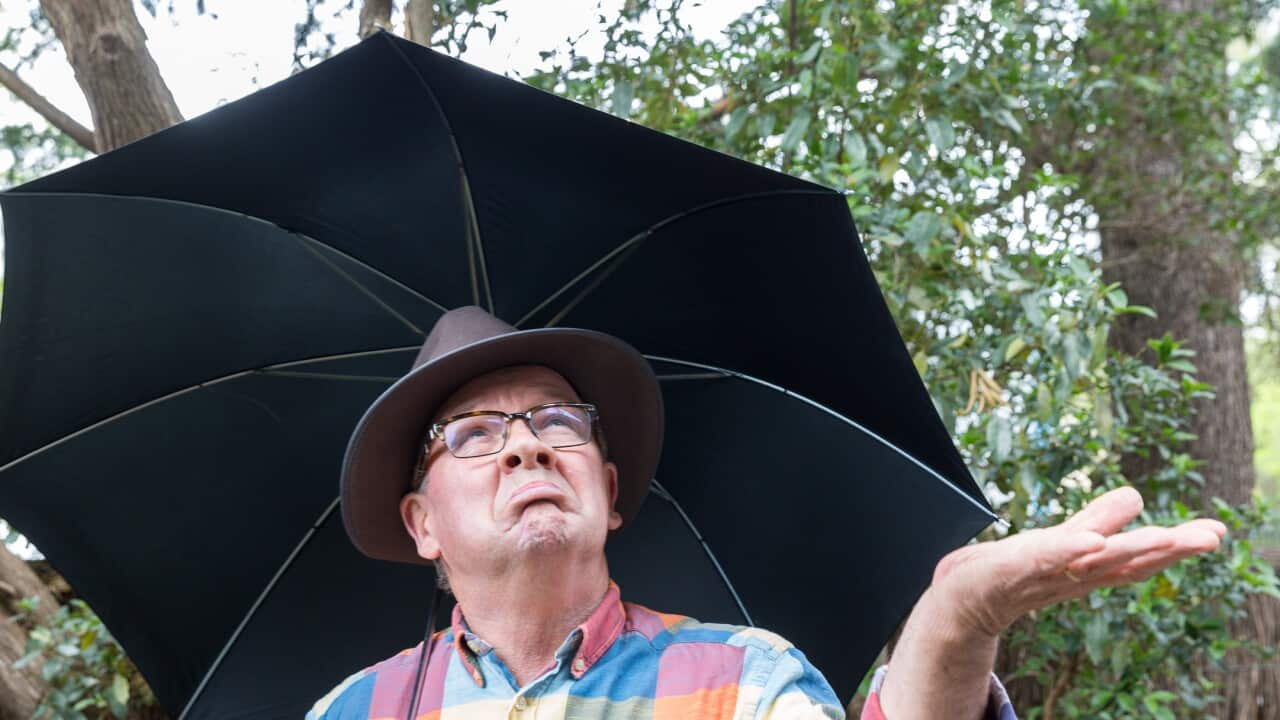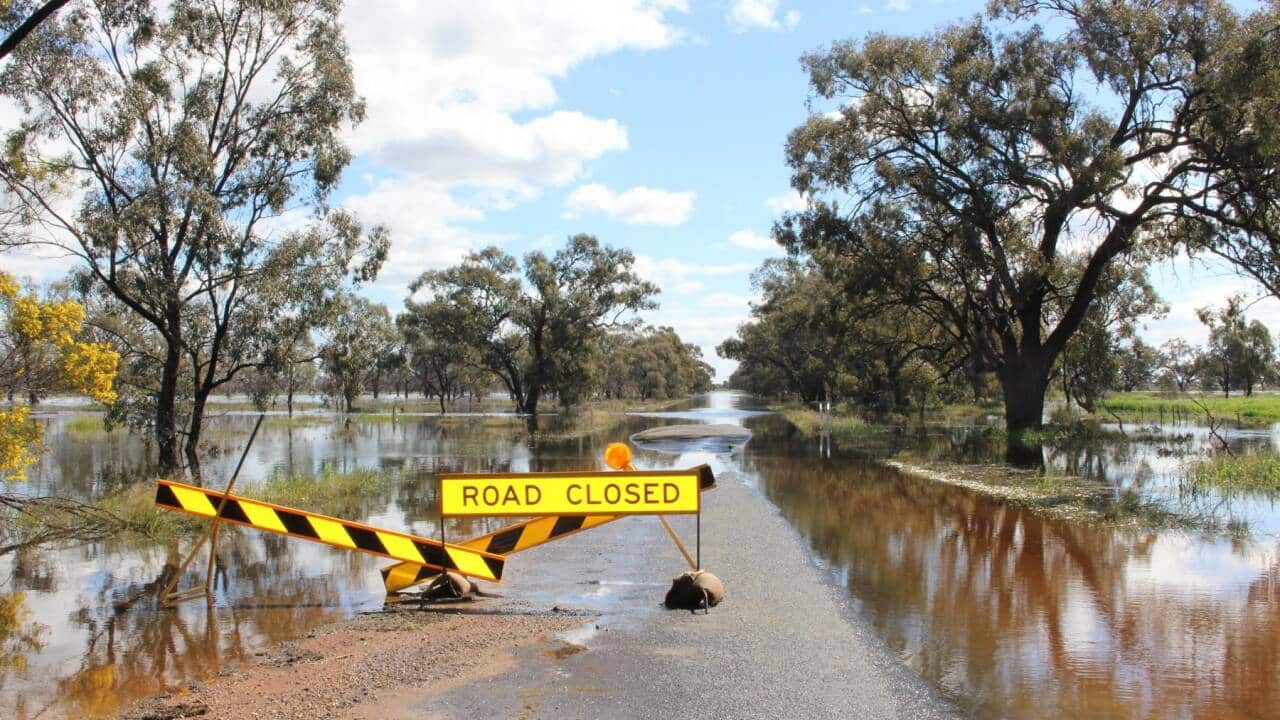This lesson suits intermediate learners. After listening, test your knowledge with our quiz.
Learning notes
Language objective
How to talk about extreme heat and rain
Different phrases to use when talking about extremely hot days:
- It’s a scorcher, isn’t it?
- I feel like I’m melting.
- This heatwave is too much!
- It's sweltering!
- It's a real sizzler!
- When are we going to get a break from his heat?
Different phrases to use when talking about heavy rain:
- It's raining cats and dogs.
- It's quite a downpour.
- This rain doesn't seem to be letting up.
- I heard that flood-prone places are being evacuated.
- I hope the rain eases up soon.
- I hope we can get home and there is no flash flooding on the road.
Colloquial expressions:
Small talk is a casual, light conversation, usually with someone we don't know well, about safe and everyday topics that are not likely to cause disagreements.
I’m melting means I’m feeling very hot.
If you are heading to the beach, you are going to the beach.
If you are trying to beat the heat, you are trying to find a way to stay cool and escape from the hot weather.
It's raining cats and dogs is a funny way to say that it is raining very hard.
If you are being evacuated, you are being asked to move to safe area.
Vocabulary:
Bushfires, also called wildfires or forest fires, are uncontrollable fires in nature like forests, grasslands, and wild areas. They spread fast and destroy everything in their way, like trees, plants, animals, and even buildings.
A downpour is very heavy rain.
When people are asked to evacuate, they are asked to leave or move to safer areas. The evacuation is done to keep people out of danger and protect them from the flooding.
A flood is when a lot of water covers land which causes damage to homes and roads.
A flood-prone place is an area that is likely to flood when there is too much rain.
Flash flooding on the road occurs when heavy rain quickly fills up the road, making driving dangerous and causing potential accidents.
A heatwave is a long period of extremely hot days.
An ice breaker is something that we say or do to start a conversation with someone we don’t know.
A scorcher is an extremely hot day.
A sizzler is a very hot day. Sizzle is the sound of something frying in a very hot pan.
Sweltering means uncomfortably hot.
Cultural information:
In Australia, the weather forecast is provided by the sometimes known as ‘The Bureau’ or ‘BOM’.
The award-winning, SBS Audio's multi-platform series assists migrants settling in Australia with practical, multilingual information about emergencies and emergency response in Australia.
Transcript:
(Note: This is not a word-for-word transcript)
SBS acknowledges the Traditional Custodians of Country and their connections and continuous care for the skies, lands and waterways throughout Australia.
My name is Josipa, and I use small talk about weather as an ice breaker all the time.
An ice breaker is something that we say or use to start a conversation. Any topic can be used as an ice breaker, but the most common one is weather.
Now, I'm sure you have noticed that, there has been a lot of talk in the news about climate change and weather-related problems.
So, in this episode we’re going to practise small talk about extreme weather.
By the way, when we say 'small talk,' we are describing a casual conversation, about everyday topics that are not likely to cause disagreements.
Small talk is one of the best things to learn when you are learning English. It helps you start conversations and gives you more opportunities to practise.
Alright, let's picture an extremely hot summer day. The sun is shining brightly in the sky, and the beach seems like the perfect place to be. At a bus stop, Allan is waiting for a bus when Claire arrives.
Claire
Whew, it’s a scorcher, isn’t it?
Allan
I know...I feel like I’m melting. It’s been over a week. When are we going to get a break?
Claire
Who knows? The forecast says this will be the hottest summer on record.
Allan
Really? I hope we don’t have any bushfires.
Bushfires. It's a word we often hear in Australia. But let's go back to the beginning of the conversation when Claire mentioned,
It’s a scorcher, isn’t it?
This is an informal expression that we can use to describe an extremely hot day.
There are many other expressions we can use to say the same thing. I’ll give you more examples later, but let’s go through the phrases we heard in the dialogue first.
I feel like I’m melting.Allan
Have you ever been so hot you have felt like you are melting? If you say this, you might feel like an ice cream melting in the sun – hot and uncomfortable.
Allan also asked,
When are we going to get a break?
Here, Allan is asking when the situation will change or improve. In this context, "a break" means relief from the hot weather, a period of cooler temperatures or more comfortable conditions.
The forecast says this will be the hottest summer on record.Claire
A forecast is a prediction or estimation about what is likely to happen in the future.
Here, Claire is talking about a weather forecast.
In Australia, the weather forecast is provided by the Bureau of Meteorology, sometimes known as ‘The Bureau’ or ‘BOM’.
You might hear people saying ‘What does the BOM say?’. Which just means ‘What is the weather forecast?’.
On record refers to historical data or information that has been collected and documented over time. So, the hottest summer on record means that it will be the warmest summer ever recorded in history.
I hope we don’t have any bushfires.Allan
Bushfires, also called wildfires or forest fires, are uncontrollable fires in nature like forests, grasslands, and wild areas. They can be extremely dangerous and cause a lot of damage.
As I said before, there are a lot of phrases we can use to say that is extremely hot. In Australia, we love talking about the weather so we have lots of ways of doing it!!
Try these phrases yourself the next time it’s really hot:
- It's sweltering!
- It's a real sizzler!
A sizzler comes from the word ‘sizzle’, which we use to describe the sound of something frying in a very hot pan.
Claire said,
This heatwave is too much!
A heatwave is a long period of extremely hot days.
If it’s been hot and dry, meaning no rain, for a long time this is called a drought. During a drought, the land becomes dry, and it's hard for crops and animals to get enough water.
Now, let’s talk about the other extreme – storms and floods.
Floods happen when it rains a lot and the water can cause damage to roads and homes.
Let's imagine it's been a week of heavy rain, and Allan and Claire are driving home in right in the middle of a thunderstorm.
Claire
It's raining cats and dogs.
Allan
Yes, it's quite a downpour. This rain doesn't seem to be letting up.
Claire
I heard that flood-prone places near the town are being evacuated. I hope we can get home and there is no flash flooding on the road.
Allan
Yeah, Fingers crossed the rain eases up soon.
I love working with Allan and Claire because they help me learn. Just when I feel comfortable with the English language, they show me phrases that I’ve never heard before.
Have you heard the phrase Claire used at the start of the dialogue when she said,
It's raining cats and dogs.
This is a funny way to say that it is raining very hard. Of course, cats and dogs cannot actually fall from the sky. At least I have never seen that! It’s just a fun expression you can use to describe heavy rain.
Allan said,
It's quite a downpour. This rain doesn't seem to be letting up.
A downpour is when the rain is very heavy. And if the rain doesn't seem to be letting up, that means that it is not stopping or getting any lighter.
I heard that flood-prone places near the town are being evacuated.Claire
A flood-prone place is an area that is likely to flood when there is too much rain.
When this happens, people might be asked to evacuate, that is to leave or move to safer areas. The evacuation is done to keep people out of danger and protect them from the flooding.
Claire also said,
I hope we can get home and there is no flash flooding on the road.
Flash flooding is when the rain is really heavy in a short period of time and a flood happens suddenly. If there is flash flooding on the road it can make driving very dangerous.
At the end we heard Allan saying,
Fingers crossed the rain eases up soon.
This means that Allan hopes the rain will become lighter or stop.
It’s really important to understand how to be prepared for extreme weather like flooding, drought and bushfires.
SBS has information in over 60 languages to help you understand what to do in these extreme weather situations.
You can find this information on our , which has articles and podcasts in your language.
And joining us today is Maram Ismali, Content Producer of Australia Explained.
Hi Maram, can you please explain to our audience what kind of content they can find on the Australia Explained website.
Maram
We have podcasts and articles in over 30 languages dedicated to assist migrants settling in Australia with practical multilingual information on migration, culture, jobs, housing and more.
Josipa
Can you give us some example?
Maram
Yes, sure! Our award winning podcast series Emergency Essentials provides essential information to navigate emergencies and nature disasters such as extreme weather hazards like heatwaves and so on.
I have to say that this series won an EMPA Award for Excellence in Emergency Communications. It consists of ten episodes, and you can listen to it on our website.
A big thank you to our educational consultant Professor Lynda Yates, and our guest Maram Ismail.
Paul Nicholson and Lily O'Sullivan voiced the characters of Allan and Claire.






